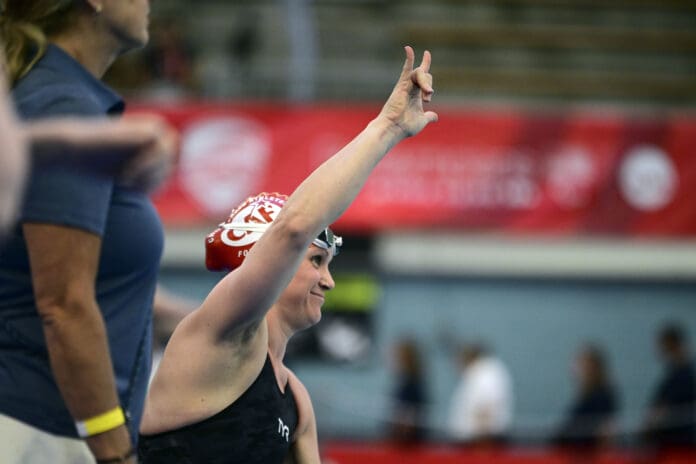Former Florida State University swimmer Christie Raleigh Crossley set a world record Thursday in her very first race in the Paralympics.
During the opening heats Raleigh Crossley set a world record for the women’s 50 meter freestyle for the S9 class. She also won a silver medal in the same race for the S10 division.
“My classification S9 does not have the 50m freestyle as an event. So in Paralympic sports, you can go up a classification, but you can’t go down,” Raleigh Crossley says. “So what I mean by that is up a classification is you’re swimming against people whose impairment affects them less [while] swimming than yours does.”
Raleigh Crossley has several more events still to come. She spoke on WSFU’s show Speaking Of before heading out for the games.
Here’s more from the athlete who says her business card reads CRC—world champion.
Christie Raleigh Crossley: I am the reigning world champion in backstroke and I am the world record holder in the 50 backstroke, but that actually came from my first long course Para meet. I had a national team coach approach me after the races, and you know, he kind of was like, ‘well, maybe backstroke is not for you.’ And then at a meet later in the year at the Olympic Training Center, I had to be pulled out of the pool after the backstroke because my arm was in such bad dystonia spasm. And so he said to me again, like, ‘hey, maybe backstroke is just not something we do.’ And you can’t tell me, like, ‘hey, don’t do that,’ because then I’m like, Okay, that’s all I’m going to focus on. And yeah, so we ended up doing pretty well in it, but I would never consider myself a backstroker. Of my four events that I’m swimming in Paris, the 100 backstroke is my least favorite. My favorite event is the 100m butterfly.
WFSU: I’m so impressed by people who swim the butterfly. I think it’s so hard.
CRC: Yeah! I when I was, I think, five years old, the story is I was at practice one day, and we were doing freestyle, and I was just doing the whole practice butterfly, and my coach, her name is Heidi, she said, ‘Christy, why are you doing butterfly?’ And according to the legend, I said, ‘well, two arms are easier than one.’ It’s funny, because now the same thing holds true. Because of my disability being hemispheric—so affecting the left side—being able to do a stroke that both sides are doing it at the same time is actually a lot easier on me neurologically, because I’m not trying to make the other arm do something while my good arm is doing something else. This way, they just work together. And I don’t have to think about, oh, that arm has to do something else. It’s just like, follow the leader.
WFSU: Is it okay if I ask you about your injuries?
CRC: Yeah! So my teammate Ellie Marks jokes that it’s like the Paralympics has been trying to pull me in for years and years. When I was at Florida State, I actually was in a car accident involving a drunk driver where we were rear ended, and I herniated several discs in my spine, and that kind of started the spine instability that I currently have. We don’t know if that contributed to the spinal cord issues that I currently have, but obviously it didn’t help. So, 2008 after I had left Florida State—I was still there as a student, but after I had stopped swimming—I was hit by a car as a pedestrian, and I came down on my head, and they believe that that impact started to grow, what’s called hemangioma in my brain. Cavernous hemangioma is what killed the runner, Flo-Jo. Hers ruptured in her sleep and she passed away. So, we think that started in 2008 and we had no idea that it was growing. And in 2018 I was hit in the head while on a ski trip, I was hit in the head with like a block of ice, and it caused a bleed of the brain of that hemangioma, and I ended up temporarily paralyzed from it. And so actually, I called football player Myron Rolle, who, as you probably know, is a neurosurgeon. We were very good friends while we were at Florida State. I called up Myron, and he was like, ‘listen, I would do brain surgery.’ He explained brain the brain surgery to me, and he said, ‘If you can’t get it done at NYU, come up to Harvard. We’ll do it here for you.’ But I ended up being able to get the surgery done at NYU. And so, they removed the tumor from my brain, the blood tumor, but because it had been growing for so long and killing the brain as it grew, I have margins of dead brain around where they removed that from, and so having that brain injury and subsequent brain surgery to remove it, I’ve been left with what’s called hemiparesis, or hemiplegia, which is weakness of one side of the body. My left side is affected, because my brain injury was on the right. I also have what’s called ataxia, which is coordination issues on that left side. And then, most recently, last year, I was diagnosed with dystonia, so I’ll have periodic tightness of the muscles. But also mine is dynamic induced. So when I do repetitive motions, like swimming, my muscles tighten up and lock. So when I finish a race, my arm is always like in a contorted manner, where it’s just like the muscles are stuck in a spasm, and so it’s like, it looks like a contracture of the limb, if that makes sense. Fortunately, though, I had so many years before my brain injury for my body to have this muscle memory of, like, how to swim, and I do have the right side that’s really good at doing things, and really strong. So we adapt and we figure it out.
WFSU: Being an Olympic swimmer has been a goal of yours since you were pretty young, right?
CRC: Since the ‘96 Olympics, watching Beth Botsford. I had met her before the games and watching her win, I was just like, ‘that’s what I want to do. I want to be an Olympian.’ Even now, like, this morning, I went to breakfast at, a girl from that I did gymnastics with in high school, I went to her restaurant, and she was like, ‘I’m so happy for you. It’s finally happening.’ Everybody in the town, it was always like, ‘Oh yeah, Christie’s gonna go to the Olympics.’ That’s what my small town’s mentality always was, like, ‘oh yeah, she’s gonna be an Olympian someday.’ And, you know, it just never happened. There was always something that came up each cycle, each quad. So now for this to finally happen, you know, parallel to the Olympics, which is what you know the Paralympics is—it’s parallel to—I do think that on this platform, I’ll be able to do a lot more good than I ever could have done as Christie the Olympian. You know, so Christie the Paralympian, can raise awareness for other people who are going through things. You know, life happens how it’s supposed to happen. And, yeah, I’m very excited to finally be able to, you know, represent Team USA.
WFSU: This is your first time participating in the Paralympics, right?
CRC: Correct. I had my injury in 2018 and my brain surgery was a month later, in 2019 and I had no idea I was even eligible for the Paralympics until I was watching the 2020 Olympics and saw an athlete, a swimmer, Michelle Konkoly, she was on TV talking about the Paralympics. And I was like, Wait, what’s her disability? Looked her up, and I was like, hold on a second. What makes you eligible for the Paralympics?
WFSU: And now you have beaten her record, right?
CRC: I broke a few of her American records. And it was funny, because we had gotten in touch with each other before I started swimming, and she texted me and said, ‘Hey, great job breaking my records, that’s awesome. I saw you did it in a practice suit. Would you like some tech suits?’ And I was like, ‘oh, yeah, I would love them,’ because it just wasn’t in the budget. As a mom of three, we’re not spending $600 on a tech suit. So yeah, when I broke my first American records, I was wearing just like a practice suit. And she, she was very gracious, and sent me some of her suits from Rio. And that’s the thing had there been more, awareness right after my brain injury, as soon as I got back in the pool, because I was, you know, trying to make the Tokyo Olympics. I was going to get in for trials, you know, to try to train for that. And I immediately knew I couldn’t when I talked to my doctor about it. If my doctor had just known, then he could have been like, Okay, well, let’s pivot. Let’s move to the Paralympic side. Then I could have, I could have been in Tokyo, probably, but, you know, that’s not how it was, but that becomes part of my story—I could have gone to another games, but I didn’t know I was eligible. So, I want to make sure that every person that is eligible for sport [is aware], and that’s a lot of us. I mean, Nick Mayhugh, he didn’t know he was eligible. Ryan [Medrano], the other T 38 runner, he didn’t find out until he was on survivor, that he was eligible for the Paralympics. And you know now he’s he’s going to Paris. So it’s all about raising that awareness.
WFSU That goes perfectly into my next question for you, which is, why are the Paralympics important?
CRC: The Paralympics gives you this opportunity as somebody with a disability to go out and be able to have these amazing opportunities. This year alone, I have traveled to Australia to compete. I’ve already gone to France to compete. I have friends all over the world, people don’t get to just do that. And so for kids who are growing up with a congenital disability, it gives them an opportunity to become an elite athlete that lights a fire in them. And then conversely, people who experience a traumatic, life changing injury like myself, it gives you that ability to have an identity again and to do something amazing, while every single day you know you’re having these trials and tribulations from having something that affects your life. Every single day my disability affects my life. So it still stands true, the basic premise and principles of the Paralympics and how it was created and why it was created still ring true today. And yes, people get caught up in the sponsorship deals and the, you know, being on TV and the media and all of that stuff, but at the end of the day, the Paralympics is there to help us all heal.


